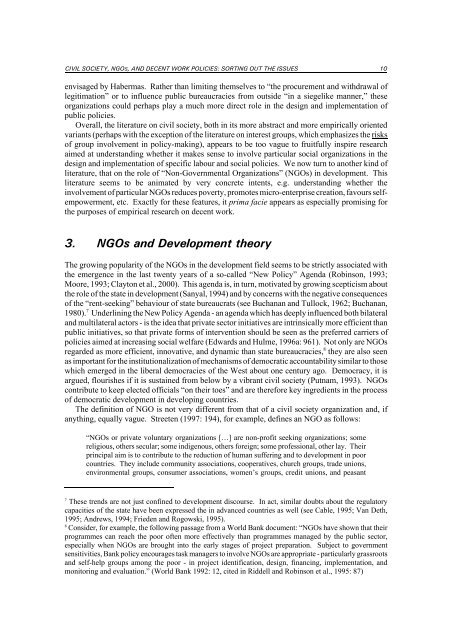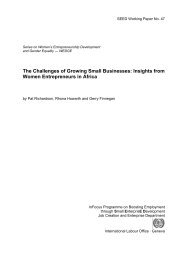Civil Society, NGOs, and Decent Work Policies: Sorting out the Issues
Civil Society, NGOs, and Decent Work Policies: Sorting out the Issues
Civil Society, NGOs, and Decent Work Policies: Sorting out the Issues
Create successful ePaper yourself
Turn your PDF publications into a flip-book with our unique Google optimized e-Paper software.
CIVIL SOCIETY, NGOS, AND DECENT WORK POLICIES: SORTING OUT THE ISSUES 10<br />
envisaged by Habermas. Ra<strong>the</strong>r than limiting <strong>the</strong>mselves to “<strong>the</strong> procurement <strong>and</strong> withdrawal of<br />
legitimation” or to influence public bureaucracies from <strong>out</strong>side “in a siegelike manner,” <strong>the</strong>se<br />
organizations could perhaps play a much more direct role in <strong>the</strong> design <strong>and</strong> implementation of<br />
public policies.<br />
Overall, <strong>the</strong> literature on civil society, both in its more abstract <strong>and</strong> more empirically oriented<br />
variants (perhaps with <strong>the</strong> exception of <strong>the</strong> literature on interest groups, which emphasizes <strong>the</strong> risks<br />
of group involvement in policy-making), appears to be too vague to fruitfully inspire research<br />
aimed at underst<strong>and</strong>ing whe<strong>the</strong>r it makes sense to involve particular social organizations in <strong>the</strong><br />
design <strong>and</strong> implementation of specific labour <strong>and</strong> social policies. We now turn to ano<strong>the</strong>r kind of<br />
literature, that on <strong>the</strong> role of “Non-Governmental Organizations” (<strong>NGOs</strong>) in development. This<br />
literature seems to be animated by very concrete intents, e.g. underst<strong>and</strong>ing whe<strong>the</strong>r <strong>the</strong><br />
involvement of particular <strong>NGOs</strong> reduces poverty, promotes micro-enterprise creation, favours selfempowerment,<br />
etc. Exactly for <strong>the</strong>se features, it prima facie appears as especially promising for<br />
<strong>the</strong> purposes of empirical research on decent work.<br />
3. <strong>NGOs</strong> <strong>and</strong> Development <strong>the</strong>ory<br />
The growing popularity of <strong>the</strong> <strong>NGOs</strong> in <strong>the</strong> development field seems to be strictly associated with<br />
<strong>the</strong> emergence in <strong>the</strong> last twenty years of a so-called “New Policy” Agenda (Robinson, 1993;<br />
Moore, 1993; Clayton et al., 2000). This agenda is, in turn, motivated by growing scepticism ab<strong>out</strong><br />
<strong>the</strong> role of <strong>the</strong> state in development (Sanyal, 1994) <strong>and</strong> by concerns with <strong>the</strong> negative consequences<br />
of <strong>the</strong> “rent-seeking” behaviour of state bureaucrats (see Buchanan <strong>and</strong> Tullock, 1962; Buchanan,<br />
1980). 7 Underlining <strong>the</strong> New Policy Agenda - an agenda which has deeply influenced both bilateral<br />
<strong>and</strong> multilateral actors - is <strong>the</strong> idea that private sector initiatives are intrinsically more efficient than<br />
public initiatives, so that private forms of intervention should be seen as <strong>the</strong> preferred carriers of<br />
policies aimed at increasing social welfare (Edwards <strong>and</strong> Hulme, 1996a: 961). Not only are <strong>NGOs</strong><br />
regarded as more efficient, innovative, <strong>and</strong> dynamic than state bureaucracies, 8 <strong>the</strong>y are also seen<br />
as important for <strong>the</strong> institutionalization of mechanisms of democratic accountability similar to those<br />
which emerged in <strong>the</strong> liberal democracies of <strong>the</strong> West ab<strong>out</strong> one century ago. Democracy, it is<br />
argued, flourishes if it is sustained from below by a vibrant civil society (Putnam, 1993). <strong>NGOs</strong><br />
contribute to keep elected officials “on <strong>the</strong>ir toes” <strong>and</strong> are <strong>the</strong>refore key ingredients in <strong>the</strong> process<br />
of democratic development in developing countries.<br />
The definition of NGO is not very different from that of a civil society organization <strong>and</strong>, if<br />
anything, equally vague. Streeten (1997: 194), for example, defines an NGO as follows:<br />
“<strong>NGOs</strong> or private voluntary organizations […] are non-profit seeking organizations; some<br />
religious, o<strong>the</strong>rs secular; some indigenous, o<strong>the</strong>rs foreign; some professional, o<strong>the</strong>r lay. Their<br />
principal aim is to contribute to <strong>the</strong> reduction of human suffering <strong>and</strong> to development in poor<br />
countries. They include community associations, cooperatives, church groups, trade unions,<br />
environmental groups, consumer associations, women’s groups, credit unions, <strong>and</strong> peasant<br />
7<br />
These trends are not just confined to development discourse. In act, similar doubts ab<strong>out</strong> <strong>the</strong> regulatory<br />
capacities of <strong>the</strong> state have been expressed <strong>the</strong> in advanced countries as well (see Cable, 1995; Van Deth,<br />
1995; Andrews, 1994; Frieden <strong>and</strong> Rogowski, 1995).<br />
8<br />
Consider, for example, <strong>the</strong> following passage from a World Bank document: “<strong>NGOs</strong> have shown that <strong>the</strong>ir<br />
programmes can reach <strong>the</strong> poor often more effectively than programmes managed by <strong>the</strong> public sector,<br />
especially when <strong>NGOs</strong> are brought into <strong>the</strong> early stages of project preparation. Subject to government<br />
sensitivities, Bank policy encourages task managers to involve <strong>NGOs</strong> are appropriate - particularly grassroots<br />
<strong>and</strong> self-help groups among <strong>the</strong> poor - in project identification, design, financing, implementation, <strong>and</strong><br />
monitoring <strong>and</strong> evaluation.” (World Bank 1992: 12, cited in Riddell <strong>and</strong> Robinson et al., 1995: 87)
















